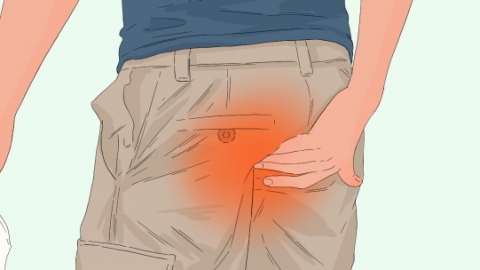How to relieve hemorrhoidal bleeding?
In general, hematochezia caused by hemorrhoids may be due to constipation with excessive straining during defecation, prolonged sitting or standing, mucosal damage of internal hemorrhoids, hemorrhoidal infection, rupture of thrombosed external hemorrhoids, and other reasons. It is recommended to seek timely medical consultation, identify the underlying cause, and relieve symptoms under a doctor's guidance through conservative management, medication, or surgical treatment. Detailed explanations are as follows:

1. Constipation with excessive straining during defecation: Dry or hard stools may cause excessive straining during bowel movements, leading to mucosal damage and bleeding of the hemorrhoidal tissue. Increase dietary fiber intake and drink 1500-2000 mL of water daily to soften stools.
2. Prolonged sitting or standing: Extended periods of sitting or standing may impair perianal circulation, causing congestion and swelling of the hemorrhoidal venous plexus, which may lead to hematochezia. Get up and move around for 5-10 minutes every hour of sitting or standing, perform simple anal sphincter exercises, choose a soft and breathable seat, avoid sitting on hard benches for long periods, and promote perianal blood circulation.
3. Mucosal damage of internal hemorrhoids: Enlarged internal hemorrhoids may rub against stools during defecation, causing mucosal damage and bleeding, typically presenting as painless hematochezia. Patients should follow medical advice to apply medications such as Ma Ying Long Musk Hemorrhoid Ointment, Gang Tai Ointment, or Yunnan Baiyao Hemorrhoid Ointment directly on the hemorrhoids to stop bleeding and promote mucosal healing.
4. Hemorrhoids complicated by infection: Bacterial invasion through damaged hemorrhoidal tissue may cause infection, with inflammatory irritation worsening mucosal injury, resulting in hematochezia accompanied by pain. Follow medical advice to take oral antibiotics such as Cefixime Capsules, Levofloxacin Tablets, or Metronidazole Tablets to control the infection and prevent its spread.
5. Rupture of thrombosed external hemorrhoids: Swelling and pain occur after the formation of a thrombus in an external hemorrhoid, and the hemorrhoid may bleed when irritated by external forces or stools. If bleeding recurs or the thrombus is large, a thrombosed external hemorrhoid excision may be required to remove the thrombus and damaged tissue surgically, achieving rapid hemostasis and pain relief.
In daily life, avoid consuming spicy and irritating foods to reduce hemorrhoidal irritation; maintain perianal hygiene, wash with warm water after defecation, and avoid excessive wiping with toilet paper; wear loose and breathable cotton underwear, change underwear frequently, and prevent perianal dampness and subsequent infection.




